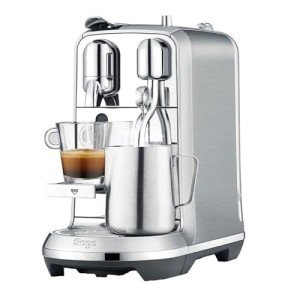A Peek Into Stainless Steel Espresso Machines's Secrets Of Stainless Steel Espresso Machines
The Art of Italian Espresso Machines: A Brewed Tradition
Italian espresso machines are not simply appliances; they are an integral part of Italy's abundant coffee culture, representing a blend of artistry, engineering, and design. Coffee fanatics worldwide acknowledge the value of high-quality espresso, a staple of Italian life and food. Buy Espresso Online explores the history, mechanics, types, and elements to consider when buying an Italian espresso machine, showing the depth of this beloved beverage and its brewing techniques.
History of Espresso Machines
The espresso machine's development go back to the early 20th century in Italy, where coffee was not merely a beverage however an important social ritual. The preliminary attempts to brew espresso started with basic, stove-top designs, gradually evolving into intricate machines that might duplicate the perfect brew.
- 1901— The First Espresso Machine: The first steam-powered espresso machine, called the “Ideale,” was established by Luigi Bezzera. This equipment marked a turning point in espresso brewing.
- 1938— The Lever Machine: The intro of the lever machine made it much easier to control the pressure utilized in espresso extraction, boosting taste consistency.
- 1947— The Automatic Machine: Reaching more customers, Gaggia launched the very first automatic espresso machine, further popularizing espresso bars.
- 2007— The Digital Age: Technological improvements caused the birth of fully programmable machines, permitting users to customize their developing settings to accomplish a tailored coffee experience.
Secret Features of Italian Espresso Machines
Italian espresso machines embody precision, craftsmanship, and development. Here are some essential elements that highlight their significance:
Feature
Description
Boiler Type
Determines how heat is produced and kept. Typical types include single boiler, dual boiler, and heat exchanger.
Group Heads
Where the coffee is brewed; commercial machines often have multiple group heads for efficiency.
Pressure Control
Important for attaining the ideal espresso; most machines run at 9 bars of pressure.
Frothing Capabilities
The steam wand permits for milk frothing, important for beverages like cappuccino and latte.
Build Quality
The materials utilized (stainless steel, brass, etc) impact resilience and heat retention.
Kinds Of Italian Espresso Machines
Picking the best machine hinges on user preferences, budget, and planned use. Below are the main types of Italian espresso machines:
Manual Espresso Machines
- Pros: Offer complete control over the developing process, allowing for an individualized touch.
- Cons: Require skill and practice, can be labor-intensive.
Semi-Automatic Machines
- Pros: Provide a balance between automated and manual processes; users manage water flow.
- Cons: Can have a steeper learning curve than totally automatic machines.
Fully Automatic Machines
- Pros: Simplify the developing procedure with push-button operations; perfect for beginners.
- Cons: May compromise some of the nuances of manual brewing.
Super-Automatic Machines
- Pros: Grind, tamp, brew, and froth automatically; convenient for hectic way of lives.
- Cons: Less control over the brewing variables, capacity for a less authentic espresso experience.
Purchasing Guide: Factors to Consider
Choosing the ideal Italian espresso machine can be overwhelming, however thinking about the following elements can simplify the decision-making process:
- Budget: Italian espresso machines vary from affordable to high-end designs, so set a budget upfront.
- Usage Frequency: Evaluate how often you will use the machine; everyday users may want a more durable alternative.
- Area: Measure your kitchen or counter space; some machines can be large and require adequate clearance.
- Upkeep: Consider ease of cleansing; machines with detachable parts or built-in cleansing functions may reduce maintenance.
- User Skill Level: Beginners may prefer fully or semi-automatic machines, while knowledgeable baristas can deal with manual machines.
- Brand name Reputation: Research brands understood for quality, such as Breville, Gaggia, and La Marzocco.
Popular Italian Espresso Machine Brands
Italian craftsmanship is renowned for producing a few of the best espresso machines worldwide. Here are top brands worth considering:
- Gaggia: Known for its home espresso machines and affordability.
- La Marzocco: A premium brand known for its commercial-grade machines and ingenious innovation.
- Rancilio: Renowned for its durable develop and professional-quality machines ideal for home and commercial use.
- Sage/Breville: Offers advanced functions and user-friendly styles, best for both beginners and enthusiasts.
Frequently asked questions
What is the distinction between espresso and routine coffee?
Espresso is a concentrated coffee brewed by requiring warm water through finely-ground coffee under pressure. It has a thicker consistency, richer flavor, and greater caffeine concentration than regular coffee.
Can I make milk-based drinks with an espresso machine?
Yes, lots of Italian espresso machines come with a steam wand to froth milk for beverages like cappuccinos, lattes, and macchiatos.
How typically should I clean my espresso machine?
Routine upkeep is vital. Normally, a thorough cleaning is advised every couple of weeks, while descaling must be done every 1 to 3 months, depending on water hardness.
What is the ideal pressure for developing espresso?
The ideal pressure for brewing espresso is around 9 bars. This pressure ensures the ideal extraction of flavors from the coffee grounds.
Are more costly machines worth the investment?
Higher-end machines frequently use better products and innovation, offering improved resilience and more constant outcomes. For major coffee fans, investing in a good machine can elevate the espresso experience considerably.
Italian espresso machines are much more than simple developing devices; they are a celebration of a cultural custom that has affected coffee consumption worldwide. With numerous designs readily available to fit any user's needs— varying from amateurs to experienced baristas— there is an Italian espresso machine perfectly suited for everyone. As you start your espresso journey, understanding the history, mechanics, and choices will enhance your experience and appreciation for this time-honored beverage. Whether Buy Espresso Online seek to recreate a café atmosphere in the house or refine your developing technique, these machines can providing extraordinary cups of espresso decorated with the rich history of Italian coffee culture.
